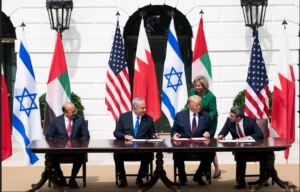- 251
- 252SHARES
CAMERA’s Israel office yesterday prompted a New York Times correction after the paper egregiously erased last year’s historic normalization agreement between Bahrain and Israel. Perhaps reflecting wishful thinking, international correspondent Mona El-Naggar falsely reported (in print, and online here, “Sundays Off: U.A.E. Changes Its Weekend to Align With West“):
One landmark moment [reflecting top-down decision making] came in September 2020 when the emirates announced they would normalize relations with Israel, a step that most other Arab countries — and all other Gulf States — have opposed, or at least been reluctant to take.

President Donald J. Trump, Minister of Foreign Affairs of Bahrain Dr. Abdullatif bin Rashid Al-Zayani, Israeli Prime Minister Benjamin Netanyahu and Minister of Foreign Affairs for the United Arab Emirates Abdullah bin Zayed Al Nahyan participate in the signing of the Abraham Accords Tuesday, Sept. 15, 2020, on the South Lawn of the White House. (Official White House Photo by Shealah Craighead)
Saudi Arabia’s foreign minister on Wednesday cautiously welcomed an agreement between its close ally United Arab Emirates and Israel to establish full diplomatic ties and exchange embassies.Prince Faisal bin Farhan said the deal, which also halted unilateral annexation by Israel of West Bank territory sought by Palestinians, “could be viewed as positive.”
Oman said Friday it backed the normalisation of ties between the neighbouring United Arab Emirates and Israel, and hoped the move would help achieve a lasting Middle East peace.
A foreign ministry spokesman expressed the sultanate’s “support for the UAE’s decision regarding relations with Israel” according to a statement on Oman‘s official news agency.
 In response to communication from CAMERA’s Israel office, The Times yesterday published the following correction in print on page A17:
In response to communication from CAMERA’s Israel office, The Times yesterday published the following correction in print on page A17:An article on Wednesday about a change in the workweek in the United Arab Emirates referred incorrectly to the normalization of ties between Arab countries and Israel. Both Bahrain and U.A.E did so last year; it is not the case that U.A.E. was the only Persian Gulf state to do so.
One landmark moment came in September 2020 when the emirates and Bahrain became the first Gulf States to agree to normalize relations with Israel, a step that most Arab countries had opposed or been reluctant to take.
Another case of @nytimes fabrication to fit preferred narrative. Where to begin? 1) notion that “all other Gulf States” oppose #UAE #Israel normalization is sheer invention. @monaelnaggar @herbertnyt https://t.co/42miOFMiJ8
Bahrain, a Gulf state, also normalized w/Israel pic.twitter.com/wGjqPvKokH— Tamar Sternthal (@TamarSternthal) December 9, 2021
For the Arabic version of this post, please see CAMERA Arabic.
